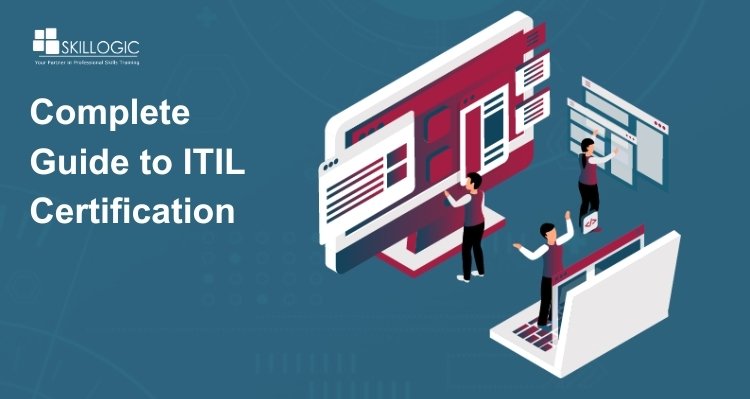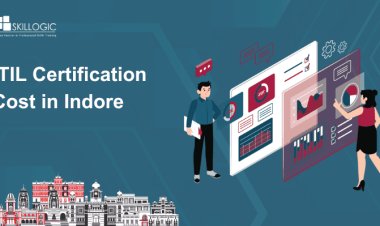Complete Guide to ITIL Certification

The most widely used framework for overseeing the provision of IT services worldwide is the Information Technology Infrastructure Library, or ITIL. During the design, development, delivery, and support of IT services, a service lifecycle model defined by ITIL mandates particular procedures and activities.
Companies can deliver services in accordance with a set of consistent, well-defined processes that include best practices and processes by implementing the ITIL framework, resulting in a predictable quality of service for users.
In this article, we will learn all about ITIL certifications.
What Is ITIL?
In the 1980s, the Central Computer and Telecommunications Agency (CCTA) of the United Kingdom established ITIL as a collection of defined best practices for IT services used by government organizations. Since its initial, narrowly focused development, ITIL has been embraced, updated, and developed into a comprehensive framework for managing IT service delivery in businesses and organizations of all sizes, in all fields and market segments.
In fact, for organizations that depend on complicated computing resources to keep their enterprises running and generating income, IT has evolved into a mission-critical service delivery mechanism. Companies can create and implement a documented, repeatable process using ITIL, which helps them stay focused on the big and little elements of launching new IT services and maintaining those services later.
Refer to these articles:
5 Phases of ITIL?
There are five practise areas or stages in the ITIL service lifecycle, and each phase has guiding concepts, rules, and procedures:
Service strategy- The emphasis of this phase is on defining services as strategic assets, followed by sustaining and putting into practise a planned, cogent strategy. Business processes, corporate governance and compliance, policies, corporate culture, and decision-making are all addressed by service strategy principles, which make sure that the company is set up for service improvement.
Service design- In this phase, business management procedures (such as service level, availability, and capacity) are evaluated with a view to creating new service offerings or enhancing those that already exist.
Service transition- The shift from development to production operations is made during this phase, which also includes testing and quality control.
Service operation- Once services are in use in production, this step outlines how to manage them. It addresses service operating procedures including event management, access management, incident response, the application lifecycle, and help desk support.
Continuous service improvement- On the basis of operational input and service levels, this phase establishes new needs for the ITIL phases that came before it. Incorporating operational lessons learned into current and upcoming service improvements helps to ensure that policies and procedures are followed, service level agreements are satisfied, and operational lessons learned are taken into account.
What Is an ITIL Certification?
A working grasp of the protocols, lingo, and methodologies utilized in modern IT is demonstrated by ITIL certifications, which attest to your familiarity with best practices for service management. Due to their ability to grow and transform the business, professionals with ITIL certification are highly sought for.
Digital services often rely on continuing project management that keeps an eye on the service's goals while also taking note of any problems that may arise throughout development, delivery, and maintenance. Knowing precisely how to incorporate all these dynamic aspects into your development process is a strong IT service management technique.
What is ITIL Certification
Different Level Of ITIL Certification
- ITIL Foundation Certification- For IT professionals who need a fundamental grasp of the ITIL framework and how it may be used for better IT Service Management, the ITIL Foundation credential is available. The core ideas and ITIL framework components that can be employed to raise the level of function quality are the subject of this course.
- ITIL Practitioner Certification- The ITIL Practitioner certification takes an extremely pragmatic approach to teaching the ITIL framework. It assists IT workers in putting the best ITIL practices into practice to further the objectives of the company.
- ITIL Intermediate Certification- IT experts who want to follow several ITIL paths should obtain the ITIL Intermediate level certification. Both service capability modules and service lifecycle modules are available at the intermediate level. IT professionals have the option of choosing a course with either of these modules depending on the career route they want to take.
- ITIL Expert Certification- IT workers who want to prove their understanding of the entire framework should pursue the ITIL Expert level certification. These pros must have taken prior ITIL certification training courses. Candidates need to have an ITIL Foundation certification and a minimum of 17 credits from ITIL Foundation and Intermediate certifications to be eligible for Expert level certification.
- ITIL Master Certification- IT professionals with ITIL Master certifications can use ITIL practices and concepts in commercial settings. Candidates for this certification must hold the ITIL Expert credential and have worked in an ITSM leadership position for at least five years.
Read these articles:
- How much is the ITIL Certification Training Fee in Bangalore
- How Much does the ITIL Certification Cost in Chennai?
- How much does the ITIL Certification Cost in Pune?
Benefits And Career Path
Today, ITIL is used in a variety of sectors, including healthcare and education. While IT professionals in mid- and senior-management positions benefit the most from the certification, those in the junior positions can also develop their careers with an ITIL certification.
The need for ITIL-certified experts is growing due to the broad use of ITIL in both small and large enterprises. A qualified ITIL professional can make 15% more than a non-certified professional; the level of certification directly affects pay.
Benefits of ITIL certification for IT professionals are quite persuasive. ITIL may greatly improve a company's quality; an efficient organization with a strong IT infrastructure does its job well. The ITIL framework helps enterprises by lowering costs, elevating general standards of the firm, enhancing IT services and customer happiness, and increasing productivity.
The IT sector will continue to be shaped by the constantly changing set of practices known as ITIL. An ITIL certification course might ease your path to success if you are a driven IT expert.
Final Note
Continual service improvement, service transition, service operations, service strategy, and service design are the five core stages of ITIL. There are subcategories of processes for each of the steps. The category of service operations includes both functions and procedures. All of the ITIL stages and procedures work together to improve services' reliability, efficacy, and continuity. Consider starting with SKILLOGIC ITIL Certification course if you want to become an ITIL expert.
ITIL Introduction
ITIL Certification KeyTerms
ITIL Service Operation Incident Management Process

 admin
admin 



